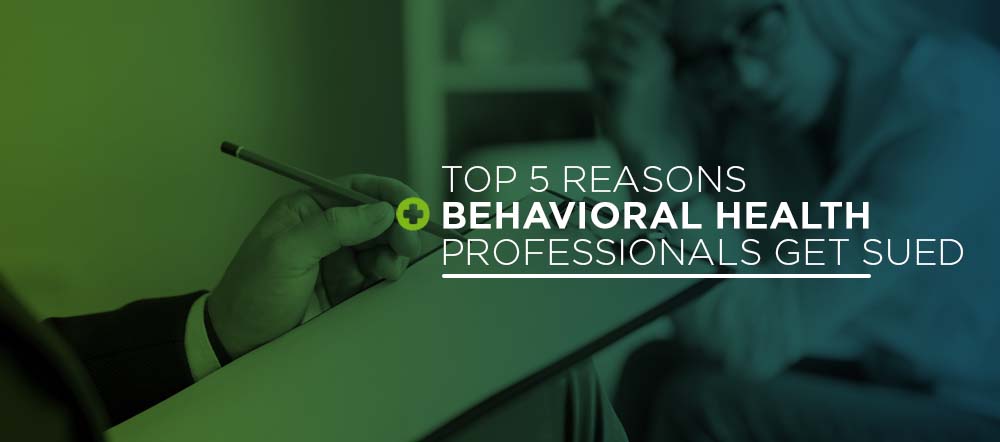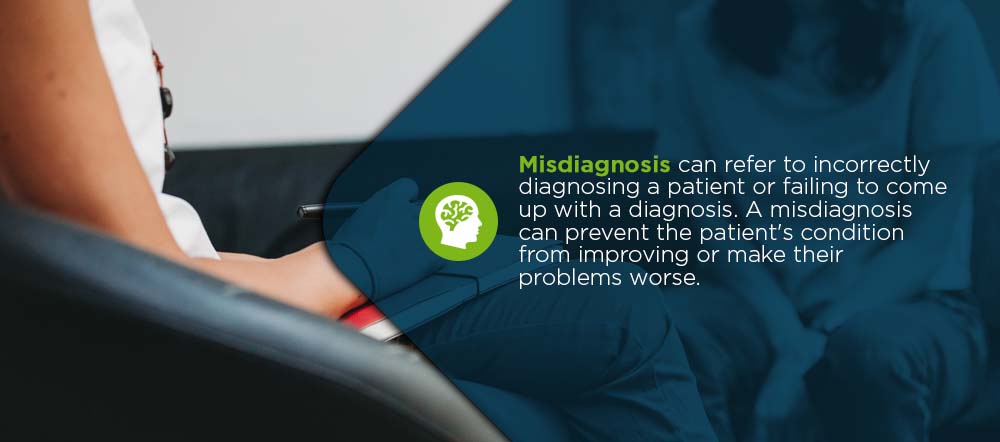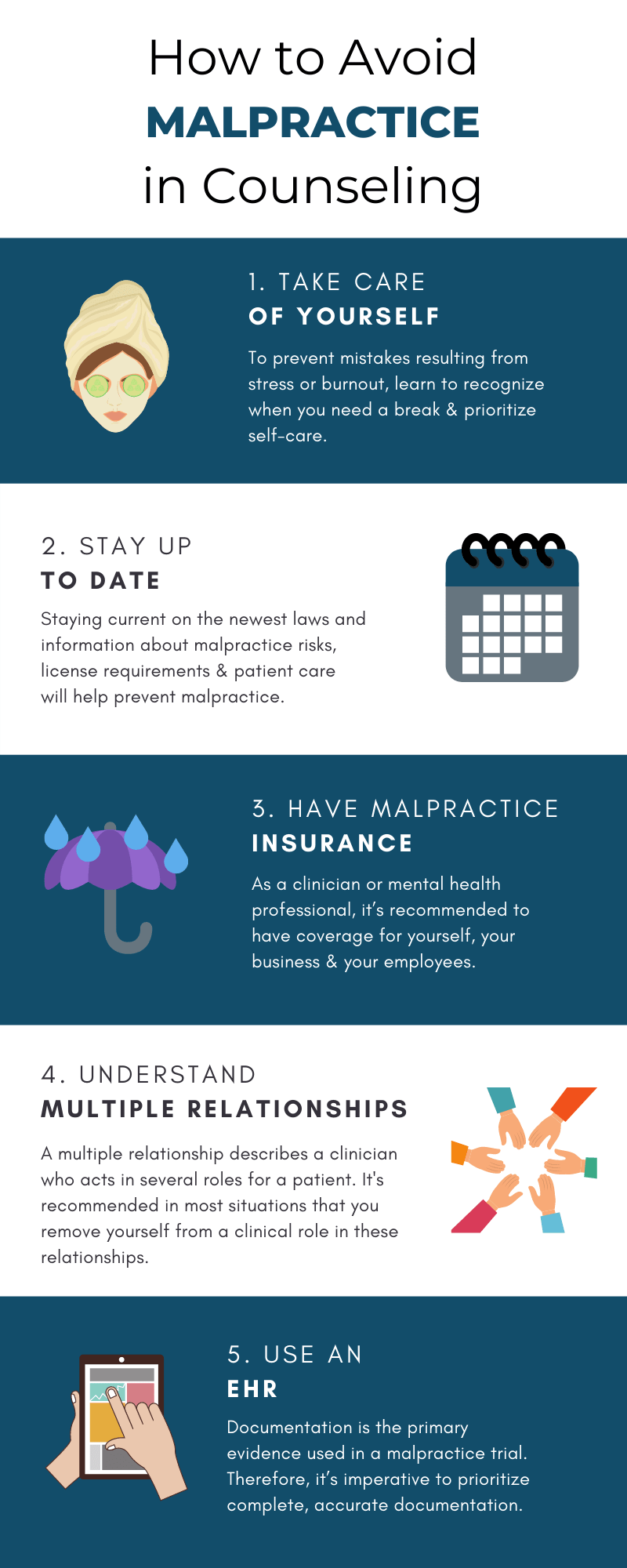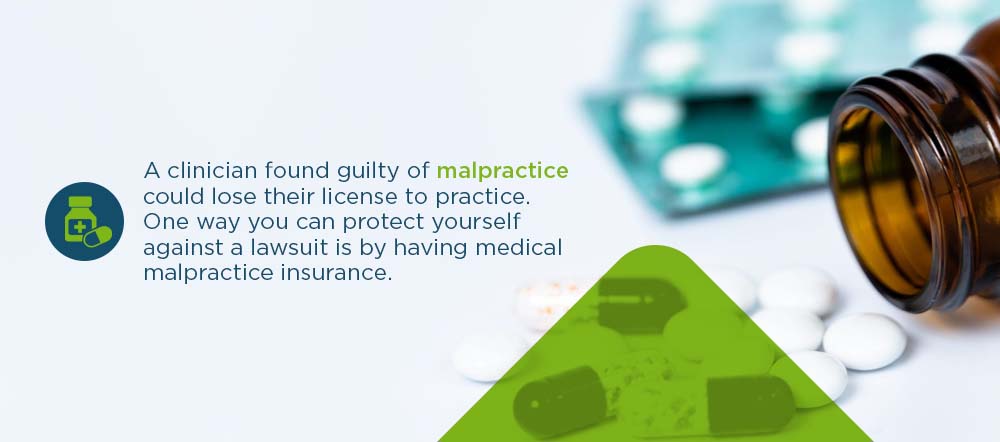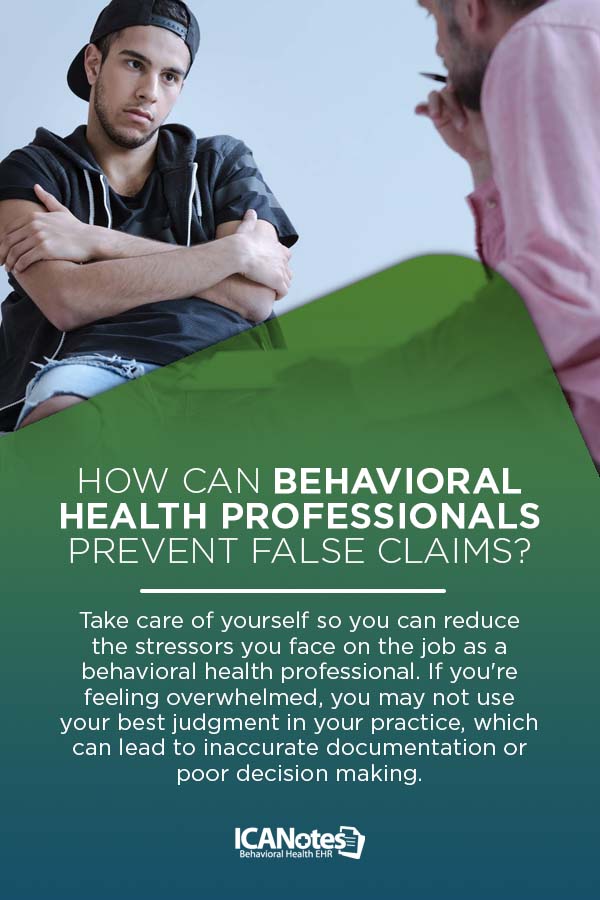Top 5 Reasons Behavioral Health Professionals Get Sued
The role of a behavioral health professional comes with a significant amount of responsibility. You are in a position to affect positive change in the lives of many. As a result, many behavioral health professionals face lawsuits at some point in their careers. While getting sued is an important concern, there are many ways you can protect yourself.
What are the top reasons behavioral health professionals get sued? What can you do to avoid a lawsuit as a behavioral health professional? Below, we explore the top five reasons professionals in the behavioral health field face lawsuits, and how you can prevent an accusation of malpractice.
Table of Contents
- Misdiagnosing
- Improper Medication and Dosing
- Breaking Confidentiality Agreements
- HIPAA Violations and Data Breaches
- False Claims
- How EHR Software Helps Prevent Legal Complications
- Trust ICANotes With Your Behavioral Health Practice
1. Misdiagnosing
Among psychiatric malpractice statistics, 2.6% of clinicians in the psychiatry field face a malpractice claim every year. Misdiagnosing a patient or failing to diagnose a patient can result in a malpractice claim.
What Is Misdiagnosing?
Misdiagnosis can refer to incorrectly diagnosing a patient or failing to come up with a diagnosis. A misdiagnosis can prevent the patient’s condition from improving or make their problems worse. Some of the most commonly misdiagnosed disorders among adolescents, for example, include ADHD, bipolar disorder and depression.
Misdiagnosis can lead to confusion, worsening condition and prescription of incorrect medication.
How Can Behavioral Health Professionals Prevent Misdiagnosing?
To avoid misdiagnosing patients, you may want to practice risk management. Among the most frequent reasons for malpractice claims are patient suicide or suicide attempt. Follow these tips for reducing liability in client suicide or a suicide attempt.
- Communicate with your patient about treatment planning: Along with explaining their treatment plan to your patient, you may also want to share details with staff and the other members of your patient’s support system.
- Collect and analyze information: To adequately assess suicide risk and create a treatment plan, you should collect and analyze patient information.
- Document risk assessments carefully: To show your reasonable judgment and improve your care for your patients, you should document the suicide risk assessments thoroughly.
- Stay abreast of patient information: Ensure you keep up-to-date records on your patient, including their treatment, medications and condition.
- Provide information to your patient about suicide: Give your patient ample details about suicide, along with risk factors and how they can identify these.
- Review previous treatment records: As part of your suicide risk assessment of a patient, you may want to review your patient’s history and treatment records.
If you misdiagnose a patient as a behavioral health professional, you run the risk of having a client sue you.
2. Improper Medication and Dosing
Patients also may complain against a psychiatrist for incorrect medication and dosing.
What Is Improper Medication and Dosing?
Prescribing inappropriate medication and dosing could result in a lawsuit. For example, if you fail to go through the process of informed consent and document it, especially if you prescribe off-label medication for children, you are setting yourself up for legal trouble. Incorrect medication and dosing also include failure to document the drugs you have ordered, changes to medications and what your basis is for prescribing this medication.
How Can Behavioral Health Professionals Prevent Improper Medication and Dosing?
A clinician found guilty of malpractice could lose their license to practice. One way you can protect yourself against a lawsuit is by having medical malpractice insurance. This insurance will protect you financially in the event of a malpractice lawsuit, and you may want to obtain coverage for yourself, your employees and your practice. This insurance may cover:
- Court expenses
- Attorney fees
- Punitive costs
- Costs for medical damages
- Costs for psychiatric malpractice settlements
Malpractice insurance will help offset expenses that relate to defending you in a malpractice case, settling the lawsuit and paying for damages. This insurance will not cover liability for criminal acts or sexual misconduct.
3. Breaking Confidentiality Agreements
Breaking confidentiality agreements is another of the top reasons patients sue behavioral health professionals.
What Does It Mean to Break Confidentiality Agreements?
While there are some circumstances in which the law may allow behavioral health professionals to break confidentiality, such as if a patient is a threat to themselves or the public, you should protect confidentiality in almost every other instance. Confidentiality refers not just to what happens during therapy, but the client’s personal information as well, including that they are in therapy.
How Can Behavioral Health Professionals Prevent Breaking Confidentiality Agreements?
Establish guidelines with your patients and in your practice to ensure that you avoid breaking your confidentiality agreements with your patients. Let your patients know what they can expect from you and your practice, what you will do for them and what you will not.
For example, you may decide to include in your confidentiality agreement that there should be no communication between patient and clinician via social media. This clause can help you avoid a potential break of confidentiality.
4. HIPAA Violations and Data Breaches
Another of the top five reasons that behavioral health professionals get sued is violations of HIPAA or breaches of data.
What Are HIPAA Violations and Data Breaches?
Under HIPAA, clinicians should protect their patients’ private information. Though your patients will not be able to sue over a HIPAA violation, they can still pursue legal action for negligence or for a breach of a privacy contract. A patient must prove the clinician didn’t protect their information from forms of data breach or theft. If a patient sustained damages from the theft or release of their data, they may attempt to file a lawsuit to recover the loss.
A patient may first decide to file a claim with the Office for Civil Rights. After filing the claim, the patient may reach out to an attorney to pursue an individual lawsuit. Several patients affected by a data breach may pursue a class-action lawsuit.
Laws vary by state, but generally, a clinician needs to protect the privacy of a patient. Along with standard HIPAA regulations, you also must keep notes that you record to analyze or document a conversation with a client confidential. Before you can share your psychotherapy notes with another health professional, you must obtain the patient’s permission, except in the instances that sharing is necessary to report abuse or prevent a harmful situation.
Unless you are releasing a patient’s information to protect them or the public from harm, you could face a lawsuit if you are releasing this confidential information without the patient’s consent. If a breach is a possibility, you must comply with the Breach Notification Rule set by HIPAA. Under this rule, you must notify the affected individual and the Department of Health and Human Services.
How Can Behavioral Health Professionals Prevent HIPAA Violations and Data Breaches?
For a psychiatrist, abuse of power is a serious charge. You may be able to prevent HIPAA violations and data breaches by staying up to date on current laws and information regarding patient care, license requirements and malpractice risks. You may want to consider joining psychological associations within your state, which may be able to provide you with guidance on issues of malpractice and the latest assessment and treatment information about patients who are at risk of suicide.
At ICANotes, our software can help you ensure that your practice remains compliant with HIPAA.
5. False Claims
The final of the top five reasons behavioral health professionals get sued is false claims. According to the False Claims Act, anyone who intentionally submits a false claim to the government — for example, Medicare or Medicaid — must pay a civil penalty of several thousand dollars for every false claim.
What Is a False Claim?
What defines a false claim? The following actions from a clinician indicate a false claim:
- Knowingly covers up a requirement to make a payment to the government
- Intentionally creates or uses a false statement or record to get payment for a claim
- Deliberately submits a fraudulent claim for approval or payment
- Consciously conspires with another person to get a claim paid for by the government
If you receive an overpayment from Medicare, you must report this and return the money to the government within 60 days after the identification of this overpayment.
For example, if a behavioral health professional is working with patients with substance abuse disorder, they may decide to conduct drug screenings regularly. The clinician may then submit claims for multiple drug screening units to Medicare, though they may only bill one unit of service per patient encounter. Doing so could result in allegations of false claims, and the clinician will need to pay back the government to cover the amount for the false claims.
How Can Behavioral Health Professionals Prevent False Claims?
Take care of yourself so you can reduce the stressors you face on the job as a behavioral health professional. If you’re feeling overwhelmed, you may not use your best judgment in your practice, which can lead to inaccurate documentation or poor decision making.
Learn to prioritize self-care and recognize when you need a break, so you can prevent burnout. Dedicate time to activities you find enjoyable, learn when you need to say no and take care of your body by eating healthy, exercising and getting enough sleep.
By putting your health first, you can ensure you are practicing behavioral health to the best of your ability.
How EHR Software Helps Prevent Legal Complications
In the behavioral health field, documentation is an essential component. Documentation is the primary form of evidence in most behavioral health lawsuits. As such, prioritizing accurate, complete notes and records is crucial. If a patient attempts to file a lawsuit against you, your documentation may prevent the proceeding of the case. Through your records, you may be able to provide proof that you made careful judgments and used reasonable care while you were treating your patient.
Electronic health record software, also known as EHR, ensures legible and secure documentation. EHR can also offer you and your practice the following benefits.
- Better prescribing: EHR enables you to prescribe more reliably and safely.
- Effective diagnosing: EHR helps you diagnose a patient more effectively.
- Enhanced security: EHR offers your practice better security than paper documents when you are sharing data with another provider to coordinate care for a patient.
- Improved convenience: EHR will give you, your fellow clinicians and your patients more convenience.
- Improved work-life balance: EHR makes documentation faster and easier, reducing burnout and giving you a better work-life balance.
- More legible documentation: EHR allows for documentation that is more accurate and legible.
- Accessible patient records: EHR makes patient records more readily available to help you prevent suicide and determine suicide risk.
To be effective and efficient, your EHR software should be intuitive, secure and easy to use. Follow these tips in your practice to get the most out of your EHR software.
- Input information carefully: When inputting patient information, take your time and review the data before finalizing it. For example, double-check the patient’s name and medication to ensure the accuracy of the data.
- Properly train staff: Train your staff to effectively and efficiently use EHR.
- Update the password frequently: Change your password often, and do not share it.
- Discuss issues and solutions: Hold meetings regularly to discuss any problems that may arise related to EHR and come up with solutions.
- Ensure understanding: Assure you and anyone else who uses the EHR thoroughly understands procedures, policies and functions to prevent system fraud.
- Treat each appointment as a new record: If you cut and paste information, you may copy over incorrect details. Instead, treat each meeting as a new record.
With EHR software, you can ensure your documentation is accurate and secure, which will help you prove your case in a lawsuit or prevent a lawsuit in the first place.
Trust ICANotes With Your Behavioral Health Practice
As a behavioral health professional, you want to provide your patients with the best possible care. By putting your best practices into place, you may be able to avoid a lawsuit. If you can avoid misdiagnosing, improperly medicating and dosing, breaking confidentiality agreements, violating HIPAA or making false claims, you may be able to significantly decrease your odds of facing a lawsuit from a patient.
Ensuring your documentation is accurate and secure is one way to prevent a lawsuit. At ICANotes, we can make your job easier and help you ensure that your record-keeping accurately reports your reasonable, thoughtful patient care.
We designed our behavioral health EHR software to be user-friendly, create easier access to patient history and reduce errors in documentation. When you choose ICANotes, you will be able to easily review your patients’ mental health history, treatment plan, medications and more before your client sessions. We also help you remain compliant with HIPAA and give you the peace of mind you need when it comes to confidentiality.
To get started with EHR software in your behavioral health practice, watch a live demo or request your free trial from us at ICANotes today.
Related Posts
How Behavioral Health Clinicians Can Avoid a Lawsuit
What You Need to Know About EHRs and Patient Privacy
Is It Legal to Provide Telemental Health Services for Patients in a Different State?

